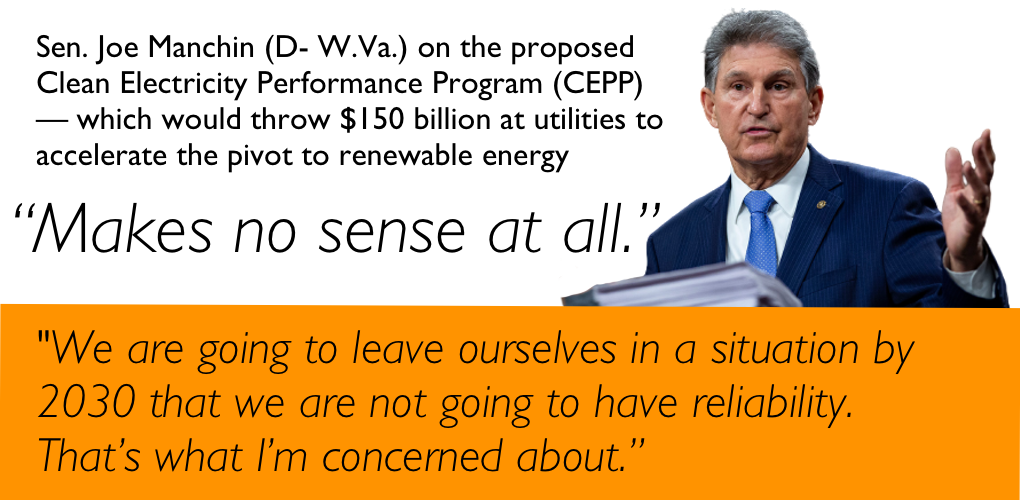
CEPP: Accelerating the Grid Reliability Crisis
Senator Joe Manchin made the rounds on the Sunday talk shows this past weekend, making it clear he can’t get behind House Democrats’ proposed Clean Electricity Performance Program (CEPP), which would throw $150 billion at utilities to accelerate the pivot to renewable energy. Manchin told Chuck Todd, the plan “makes no sense at all.” He continued, “We are going to leave ourselves in a situation by 2030 that we are not going to have reliability. That’s what I’m concerned about.”
He’s right to be concerned, and his concerns reflect those shared by American voters. According to recent polling from Morning Consult, 72 percent of Americans are now concerned that the speed of the transition to variable sources of power is coming at the cost of grid reliability.
Even more, his concerns echo those coming from regulators and utilities themselves. American Electric Power, one of the nation’s largest utilities, wrote in a letter to congressional offices and made public this week that the CEPP would “adversely impact the reliability and resilience of the electric grid,” adding that it forces utilities to move “too rapidly.”
Yet, despite those warnings from those charged with keeping the lights on, accelerating the energy transition – without any plan for reliability – is exactly the proposed path forward from some members of Congress, and that path is being taken absent discussion or planning. The CEPP is an incentive program on steroids that, if implemented, could dismantle grid reliability even as energy markets send unmistakable signals to reinforce it.
Overreliance on natural gas for dispatchable power as U.S. natural gas prices soar, doubling in just a year, has become a glaring vulnerability as the challenges of integrating greater amounts of variable power begin to snowball.
The future Senator Manchin is so concerned about doesn’t require imagining. We’ve gotten a startling preview of it in California and Texas, where blackouts and the threat of them have become all too common, and we’re now watching in real time in Europe as reliability and affordability concerns crest into a continent-wide crisis.
Europe’s Self-Imposed Energy Crisis
As the Wall Street Journal recently reported, soaring natural gas prices, low gas inventories and uncooperative weather have sent European energy prices through the roof. In the U.K., electricity prices have more than doubled in September and are 10 times as high now as they were a year ago. The story is much the same in Spain, France and Germany. No corner of Europe appears unscathed.
As the Journal explained, “natural gas and electricity markets were already surging in Europe when a fresh catalyst emerged: The wind in the stormy North Sea stopped blowing.”
While abundant wind power can lead to moments of cheap electricity, when it disappears grid operators and utilities are left scrambling. This month, U.K. wind farms have produced less than one gigawatt of power some days despite 24 gigawatts of installed capacity. That’s a story hardly confined to the North Sea.
In February, when the Texas grid needed its vast wind capacity most, nearly 20 gigawatts of nameplate wind generation was simply a no-show as the state descended into darkness. No fuel source came out of the Texas February grid catastrophe untarnished – in fact, natural gas faired worst of all – but it’s increasingly clear heavy reliance on intermittent sources of power is posing unique challenges that policymakers, regulators and utilities are only just learning to fully understand. And that appears to be precisely Senator Manchin’s point.
If responsibly managing the energy transition is the goal, why use tens-of-billions in taxpayer money to accelerate the pivot away from the remaining fuel diversity and fuel security that is a refuge for consumers?
In Europe, the potential for energy catastrophe has grown so high Amos Hochstein, senior adviser for energy security at the U.S. Department of State, recently warned that, “lives are at stake.” He told the Financial Times, “If you get a real cold winter by January and February, you could run out of [gas] supplies.”
Europe has manufactured its own crisis in the race to decarbonize – forcing crushing energy costs on consumers, dismantling dispatchable fuel diversity and settling for stunning overreliance on Russian natural gas and the price volatility of the global gas market. There’s no reason why the U.S. should take a single step down that path. To quote Senator Manchin, “it makes no sense at all.”
- On September 15, 2021
